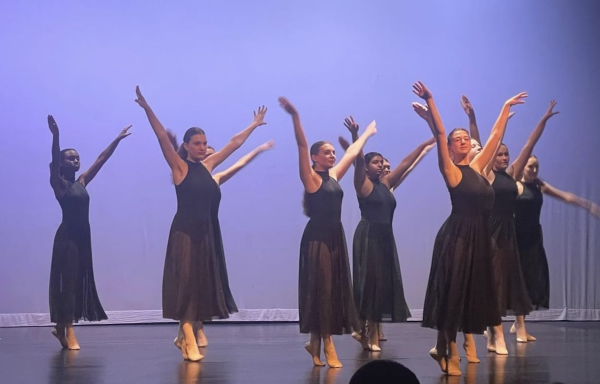A Conversation with Katie Couric
April 14, 2021
Contemporary Topics in Feminism, the junior and senior year elective taught by Upper School History Teacher Caroline Helmers, examines women’s rights and experiences throughout recent history. During the course, we watched documentaries, discussed articles, and challenged our own biases. One discussion took place after viewing Miss Representation, by Jennifer Siebel Newsom, as a class. The documentary examines the mainstream media’s role in the portrayal of women and how that relates to societal standards. Journalist Katie Couric was featured and spoke about the evolution of feminism within her industry. Following our discussion, I reached out to Couric hoping to speak with her about her career in journalism. She agreed, and my classmate, Sasha Sheikh, and I were able to interview her and ask questions regarding misinformation, her various roles, and current-day feminism. Her insight was invaluable, and Helmers said that “Couric was able to give first hand experience to accompany many of our discussions.”
Katie Couric was inspired by her father, a fellow reporter, and her awareness of current events drove her to pursue journalism. By the time she graduated from the University of Virginia, many other women were entering the workforce, and, in her words, “the people who wanted to keep the broads out of broadcasting were a dying breed.” She drew inspiration from NBC’s Jessica Savage, White House Correspondent Ann Compton, and The Washington Post’s Bob Woodward.
Prior to accepting her job on the Today Show, Couric insisted that the division of labor be equal instead of taking on a secondary role. She already had an immense amount of experience, including serving in the coveted role as Deputy Pentagon Correspondent at NBC. Whether she knew it or not, her legacy in television would be historic for future women in the media. She reflected on her time at CBS as a step towards challenging the patriarchal system that existed in journalism. In hindsight, being the first female to anchor the CBS evening news alone, she said, “challenged peoples assumptions and stereotypes in their minds that had been inadvertently established.”
Coupled with her success also came overwhelming backlash and conflicting personas created about her by the public. Katie was told by a colleague, “when you’re a trailblazer you get burned.” And, similar to the tropes discussed in our Feminism course, Couric mentioned tropes that were created by writers and the media about her. “A lot of people said I lacked gravitas,” she said, and to which she responded, “on what basis?” Her career defied the traditional media strictly because of her gender, which she believes is why so many of her viewers had what she said was a “disconnect” and trouble “integrating both sides of me.” Couric explained that she felt added pressure because people tried to compartmentalize her into one identity and didn’t want to offer her hard-hitting news stories. “It’s hard to see people as a multidimensional person… and for those reasons, I was always trying to prove myself,” she said.
Throughout the course of our class, we covered each wave of feminism and its impact on today’s world. “Feminism is experiencing an exciting revival,” Couric said, and in recent years there has been a reckoning in media industries that are making people, in her words, “question the narratives we are taught.” Especially due to the variety of news covered, Couric said, “diversity is so critically important because everybody covers stories that are colored by their own life experiences.” Couric’s main argument is that there needs to be a “recognition of people’s implicit bias” because now, culturally, we are all conditioned to equate people in certain gender roles. Her significant roles on television throughout her career also helped normalize and encourage a more diverse media field. What she hopes will come in current-day fourth-wave feminism is that, following the pandemic, there is a more equal divide among housework. This also connects to better maternity policies for mothers and fathers.
Couric also shared concerns and what she believes is the harsh reality of current-day journalism. “Everyone seems to have an agenda, but on the other hand you see these things happening that are so upsetting and morally wrong so are you not supposed to have an opinion about that?” Especially because of the current political landscape in America, it’s hard to not write passionate pieces, but is that dividing us even further? When Couric reflected on the start of her career and compared it to now, she recognizes that “it’s all commentary and punditry and not a lot of reporting” and that information “gets manipulated and weaponized to support the view of either side.”
We asked about her favorite podcast and besides her own, Next Question, she said she is a fan of The New York Times’ “The Daily.” At the time, she mentioned the possibility of having Prince Harry on as a guest, and just recently it was announced that she will be continuing the fight against misinformation with him. Both of them will work as commissioners at The Aspen Institute on information disorder, specifically in America.
Couric’s career has evolved with the changing times and she has integrated a large portion of her identity onto social media. Her company Katie Couric Media, which she founded with her husband, John Molner, works to produce meaningful stories in the format of articles, videos, and social media. She also shoots her own Instagram stories and videos which differs from her previous experiences working with traditional camera crews and editors.
Couric ended the conversation complimentary of Gen Z, saying that “it’s great for me to talk to you all because you’re the future.” Her advice to young journalists mainly involves taking advantage of social media by “creating your own opportunities,” being persistent, informed, and most importantly, taking after her mother’s mantra, “let ‘em know you’re there.”





